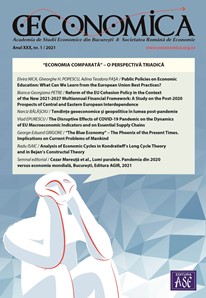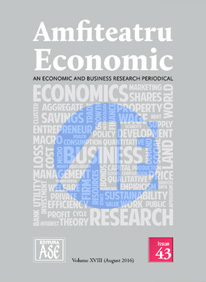
With Concern, Concerning Pensions Economy Near Us (XIX)
In a well-ordered society (in Rawlsian terminology), every person gains his social place and, consequently, his income (wealth) based on his objective merits – usually based on his work. Unfortunately, beyond a certain age, the physiology of humans does not allow people to engage in work activities anymore. In such a situation, some resources (usually in monetary expression) are needed to maintain the standard of living or, in more general terms, the wellbeing (no matter if all persons agree with a little smaller level of it, since, in fact, the general needs are, after the mentioned age, smaller). These resources form the concept of pension – that is retirement benefit. But who must provide the pension to retired persons? All logical judgements would tell us that the pension should be composed of savings on the part of the beneficiaries themselves, from their personal (or disposable) income gained during the active period of their life. Such savings should be the result of prudential behaviour in the long term. Since, in the real world, the prudential behaviour is not granted to all persons, the state took over the burden to fuel that “savings account”. Such saving has some features as follows (NB: I discuss here only the type of public pensions of the 1st pillar in the Romanian system, the pay-as-you-go public system):
- it is a mandatory saving – established and sanctioned (if the case) by fiscal law;
- it is a transitive saving (more particular, an inter-generational saving) – the persons which are active on the labour market feed the pensions payments for their contemporary retired;
- it is a contributory saving – only those who have saved receive pensions, and the pensions are directly proportionally with that saving.
I think that pensions need to be discussed at least regarding three fundamental issues:
- which is the role of the state in the case of pensions;
- which are the most proper means by which the state accomplishes its role;
- which are the problems with the non-contributory pensions (special or occupational pensions, for example).
The pensions and the state
The state is a system (probably contractual) of delegation of common responsibility from the dissipated individuals to some specialized individuals (or considered as such), who are sometimes institutionally concentrated, and to named representatives. They are empowered to decide on various issues in valid, legal and moral way, in the name of all the individuals (including the representatives). Consequently, the state must guard either the interests or the rights of individuals. But, to choose between interests and rights is a problem in itself. In my opinion, the rights should be derived from the interests, so the state should, in turn, have as duty the preservation of the individual interests. Of course, in order to harmonize (and, possible, to maximize the “societal interest”) it could be necessary to preserve also the rights associated to interests, but this conceptual regression will be left out of our current discussion.
In order to preserve the interests of the individuals, the state can assume a function which could be named as non-required prudentiality function (NRPF). By “non-required prudentiality” I understand a sort of care which the state must manifest related to the persons incapable of knowing or being conscious with respect to their own interest. The state NPRP can address at least five situations:
- aged persons who cannot ensure their biological existence (for example, retirees);
- persons with disabilities, who are, consequently, facing difficult to surmount frictions in social interactions;
- persons whose early age prevents them to properly take care of themselves (for example, children);
- persons with specific requirements, biologically- or culturally-driven (for example, women);
- persons who face health challenges which cannot be covered by their own financial means.
State means in the pensions matter
As shown above, the public pension (or 1st pillar) is a means by which the state is paying for one of the obligations derived from the NRPF. In fact, the state is involved in managing the aged person’s interests by using of two kinds of means: a) imperative means (like this pension pillar); b) nudged means (like the 2nd and 3rd pillar, the mandatory and optional private pension). The imperative means should be used when the culture of managing self-interest is underdeveloped, while the nudged means are more appropriate when such a culture is well established. Of course, as society evolves, the focus is moved from the imperative means to the nudged one.
In this context, the following considerations could be made regarding the public pension system:
- our society is in a stage in which the NRPF of the state is inevitable, because the weak propensity of the individuals to save of their own initiative for the inactive future period;
- the concept and the culture of extended family is almost inexistent, although locally (especially in the rural habitats) one can still experience such realities; by extended family, we understand the co-existence (economically, psychologically, and culturally) of three generations: parents, children and grandchildren;
- the individual financial literacy is still very weak (including the content of the mandatory period of education), which leads to a generalized risk aversion related to private investment (either direct or for portfolio).
So, the active character of the NRPF of the state seems to be non-disputable.
About the non-contributory pensions
The non-contributory (or special) pensions for certain occupational categories (state magistrates etc.) are outside of the reasoning based on the NRPF of the state. This means, prima facie, that such pensions cannot be justified using the above considerations. Consequently, are they unjustifiable? Yes and no. They are unjustifiable because they discriminate against the rest of population, taking into account that there is not an identical starting point of the contributors and non-contributors to the public pension fund. However, we can build a justification for the non-contributory pensions based on other mandatory (in my opinion) functions of the state. I would name such a function as socially necessary protective function (SNPF). This function is aimed at protecting the professional categories of individuals which assume the riskiest or responsibility endowed positions/occupations, which, in turn, are of a crucial relevance and significance for society as a whole. The protection based on the SNPF encourages the individuals of the next generations to continue to assume the mentioned positions/occupations, for the benefit of society. Of course, the criteria to select the positions/occupations for applying the SNPF is both of scientific, philosophical, and political nature. It is fundamental that the society should democratically decide on such criteria and on accepting the SNPF.
Photo credit: pxhere.com








